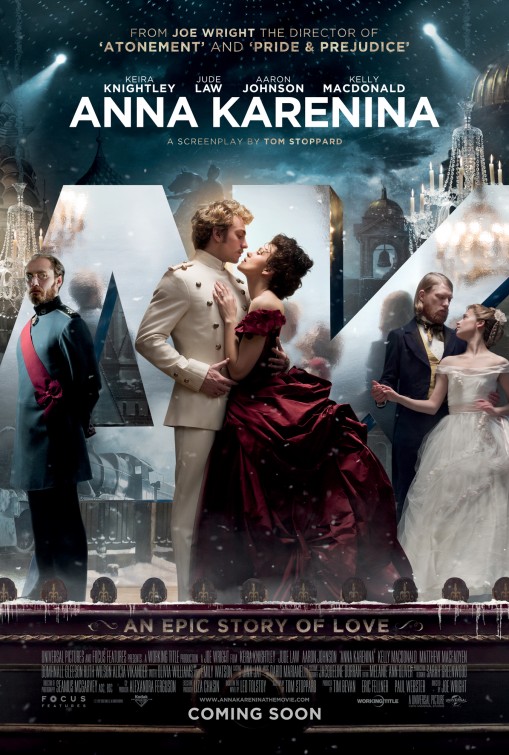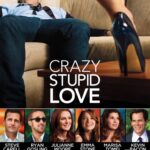You Can’t Ask Why About Love
Director
Joe Wright
Starring
Keira Knightley
Aaron Taylor-Johnson
Jude Law
On occasion, directorial ego can overtake a film. I’m not talking about directorial signatures or traits, or even controlling or focused directors but those who inadvertently smother a story and their actor’s performances in order to sell the idea of the film. Baz Luhrmann is renowned for this. Having read the novel, Anna Karenina isn’t exactly the most adaptable story, with two heavy parallel threads, lots of travelling around Russia and Europe and several months (closer to years) passing, a lot of material would need to be discarded. And it has, much to the story’s detriment and the whole thing suffers accordingly.
Set in 19th Century Russia, the story opens with high society debutante Anna Karenina [Knightley] being called from St. Petersburg to Moscow to aid her brother Stepan ‘Stiva’ Oblonsky [Matthew Macfayden] whose indiscretions with the family governess have been discovered by his wife. Anna’s busy statesman husband, Alexei feels it is none of their business but permits her to go. On the train to Moscow, Anna speaks with Countess Vronskaya [Olivia Williams] who explains she is meeting her son, Count Alexei Vronsky [Taylor-Johnson], a young cavalry officer who is expected to propose to Anna’s sister in law, Ekaterina ‘Kitty’ Scherbatskaya [Alicia Vikander]. Following all this so far? Good. To add confusion to the matter, an old friend of Stiva’s, Konstantin Levin [Domhnall Gleeson] is visiting also intent on proposing to Kitty. Vronsky meets Anna and falls for her. Kitty rejects Levin’s proposal hoping Vronsky will ask. Vronsky doesn’t and makes a scene with Anna, a married woman. An affair between the two starts and spirals out of control but Russian divorce law stipulates that only the ‘innocent’ party can request a legal divorce, which Alexei Karenin will not allow for fear of scandal. Wracked with guilt, Anna descends into a jealous delirium and continuously fights with both her lover and her husband. Some other stuff happens. See, this is the problem, you can’t give a brief summation of a book nearly nine hundred pages long and the script can’t either, so it just fumbles around trying to cover the essentials.
First thing to analyse is the ‘theatre concept’. Neither a musical, nor a stage production, nor a film, Joe Wright has opted for something in between. As the movie opens we see an empty stage with a curtain slowly raised, followed by an overly theatrical shaving of Oblonsky’s moustache (or everything around it); in earnest, it’s actually quite funny. While this happens, we also witness Anna reading the letter from her brother, informing her of what we are seeing. The camera pans around behind the stage, in the rafters, into the audience pit (which is empty) and stagehands pop up bringing in set pieces and props – much like a theatrical production. Everything flows beautifully and the editing is absolutely pitch-perfect. But as this is spooling on, I couldn’t help but question why. Why set it in a quasi-theatre environment, why the elaborate timed movements in key with the music, why the ridiculousness? You’re detracting from the heart and soul of the story which is Russian family politics and the harsh nature of divorce for 1800’s Russians. You’re making sport out of a sombre tale that should be focused on betrayal, love, adultery, duty, vanity, composure, jealousy, bitterness, pettiness, vengeance, etc. And then, as if to make matters worse, Levin returns to his country estate and the back wall of the stage opens up to reveal a vast snow-covered horizon. The use of actual exteriors highlights the futility of this setting, this is an epic, sprawling Russian tale! We need big buildings, lavish interiors, exquisite jewels and costumes, vast harsh landscapes! So, when you get a glimpse of these, you can’t help but grind your teeth and mutter, “The whole movie should be like this”. Granted, I appreciate this is a novel way of getting around things like budgetary concerns and travel costs but unless you completely stick to your chosen premise, you ruin the overall aesthetic. Oddly enough, Sucker Punch sort of did the same thing.
Due to the nature of the rushed plot and the unusual production design, the acting varies from scene to scene. At times, the performances are wholly engrossing and intriguing to a breathtaking degree yet ten minutes later they delve into secondary school drama level, full of hammy lines, gurning faces and mediocre deliveries. The inconsistent acting quality is probably more disorientating than the mad “We’re in a theatre.. or are we?” bullshit. On top of that, without real exploration of Anna’s descent into madness, outside of one scene and a handful of lines, her transition seems obtuse and almost pathetic. What should be a portrayal of a strong woman broken by growing guilt and paranoia is just the hysterical ramblings of a weak-willed woman. As such, Levin’s story comes off as far more interesting but we’re only fed dribs-and-drabs so audiences are left wanting.
The production value is astounding and the attention to detail in costume, props interiors are very impressive but without the lavish backdrops something feels missing. As if watching Lawrence Of Arabia projected onto a wall six hundred yards away… with binoculars. It looks Russian, it sounds Russian but it doesn’t feel Russian. In going for this extravagant format, Wright has lost the heart and message of the book and created a largely forgettable mess. Kind of reminded me of the animated film Anastasia, big, colourful and arrogant but so very very wrong.
Release Date:
7th September 2012
The Scene To Look Out For:
**spoilers within**
I’m confused. I appreciate that with all adaptations certain details and plot threads must be culled for budgetary and time factors. In the novel, the story winds down and Anna throws herself under the train. This happens in the film too, no problem there. Unless I’m mistaken and was simply anxious to leave the cinema, I can’t remember what happened to Vronsky. In the book he can’t stand that Karenin forgives him, goes a bit mental and shoots himself but doesn’t die then he mopes about a lot and buggers off with his regiment to fight the Turks.. or something. Now I appreciate there was no time for all that but I can’t even remember what happened to his character. I don’t think anyone explained it, we just see Karenin in a field with ‘his’ two children.. then the film ends! So.. basically.. I didn’t like the ending. At all. It probably pissed me off the most.
Notable Characters:
Domhnall Gleeson was enjoyable as Levin and the scenes in which he takes council with Matthew Macfayden are both entertaining and amusing. Other than that, everyone else was too all over the place. Sometimes Keira Knightley would be wondrous to watch, other times I was rolling my eyes with as much theatrical exaggeration as I could muster. Jude Law, on the other hand was actually quite impressive but being so muted and subdued it was next to impossible to get behind his performance.
Highlighted Quote:
“It would be a sin to help you destroy yourself”
In A Few Words:
“A classic tome butchered, commendable performances lost and a reasonably novel concept squandered. Disappointing”
Total Score: 2/5
![The Red Right Hand Movie Reviews [Matthew Stogdon]](https://reviews.theredrighthand.co.uk/wp-content/uploads/2021/12/cropped-header1.png)




